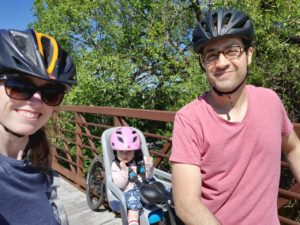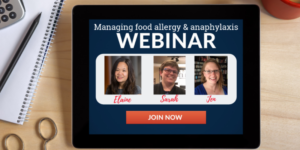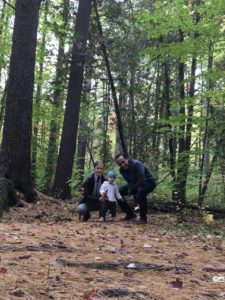
Gerardo C. is a new food allergy dad from Ottawa, ON. In May of this year, life as he knew it became different as his daughter was diagnosed with allergies to peanut, tree nuts and milk at age 1.
“It was overwhelming and stressful when we discovered my daughter had a food allergy, we were at a loss at how to manage this condition,” Gerardo recalls. “My wife and I had to very quickly accept the diagnosis, and go to the next step, which was knowing how to manage it, to help keep her safe.”
Due to the pandemic, it took a while for Gerardo’s daughter to see an allergist. “We knew she had two anaphylactic reactions, but not knowing what she reacted to and the possibility that she could be allergic to multiple foods was the biggest challenge.”
In the meantime, he decided to bring his daughter to see a nutritionist who has expertise in food allergy. “She gave us some helpful resources and recommended Food Allergy Canada’s site.”
Being a lifeline
A lot of time can pass between the initial reaction and seeing an allergist, especially when there are over 3 million Canadians affected by food allergy and only 200 allergists. We are the only national organization that fills this gap and provides ongoing education and support.

Gerardo and his wife took our small group webinars on managing food allergy and anaphylaxis, downloaded the newly diagnosed handbook, and watched many recorded webinars. “I took all the webinars you have saved online, and it was in one of them where I learned how to feed my daughter before we could see an allergist.”
With so much misinformation out there, it is essential to get credible and accurate information on how to manage food allergy from the beginning. “We needed to very quickly determine what was a reliable source of information and what might not be reliable,” he explained. “We decided very early not to consult opinion-based resources, but to go to more official resources like Food Allergy Canada that has medically-reviewed and evidence-based information. Plus, the big advantage is that the resources are specific to Canada. I was able to quickly and accurately learn requirements for food labelling and information on the priority food allergens in Canada, which are essential for staying safe.”
Gerardo agrees that our educational programming should remain accessible and free, especially for Canadians living in remote communities where there is less access to information. “We’re lucky that we were able to find a healthcare professional that is specialized in food allergy because we’re in Ottawa, which is a large city with lots of resources.”
Creating confidence

Gerardo’s advice is centred on being in control, doing your research and learning how to manage your child’s food allergy. “Knowledge is key. Be sure that the source of information is reliable. After we learned about food allergy and how to manage it, life feels normal,” he explained.
If there was one word to describe his experience with Food Allergy Canada’s programs, Gerardo was quick to say “helpful”. “We feel much more confident managing food allergy with the tools we learned in the session and the support we received. The newly diagnosed program provided us with the critical knowledge we need and information we can trust. It absolutely changed our lives and helped us tremendously.”
Help us continue to provide important educational programming like our newly diagnosed resources for free by donating today.
For more information and to learn more about our newly diagnosed resources, visit our newly diagnosed section at foodallergycanada.ca/newlydiagnosed.
Tags: Newly diagnosed